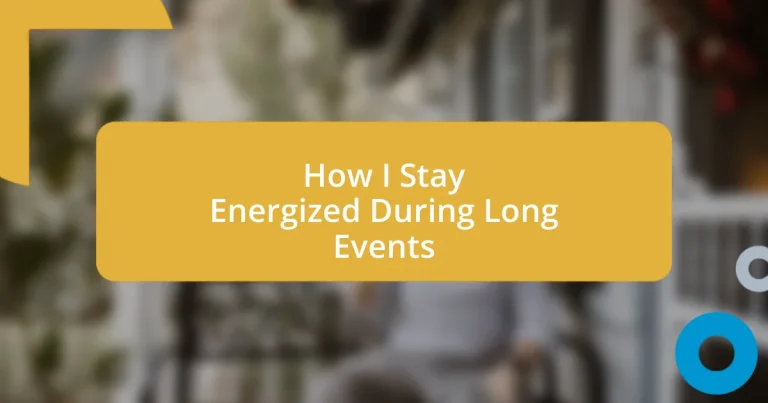Key takeaways:
- Managing energy levels involves understanding personal patterns, hydration, nutrition, and incorporating effective rest strategies during long events.
- Staying hydrated and consuming balanced meals, along with mindful snacks, significantly impact energy and focus; electrolyte replenishment is also crucial.
- Implementing short breaks, physical movement, and mental techniques like visualization can optimize energy and enhance performance during extended engagements.
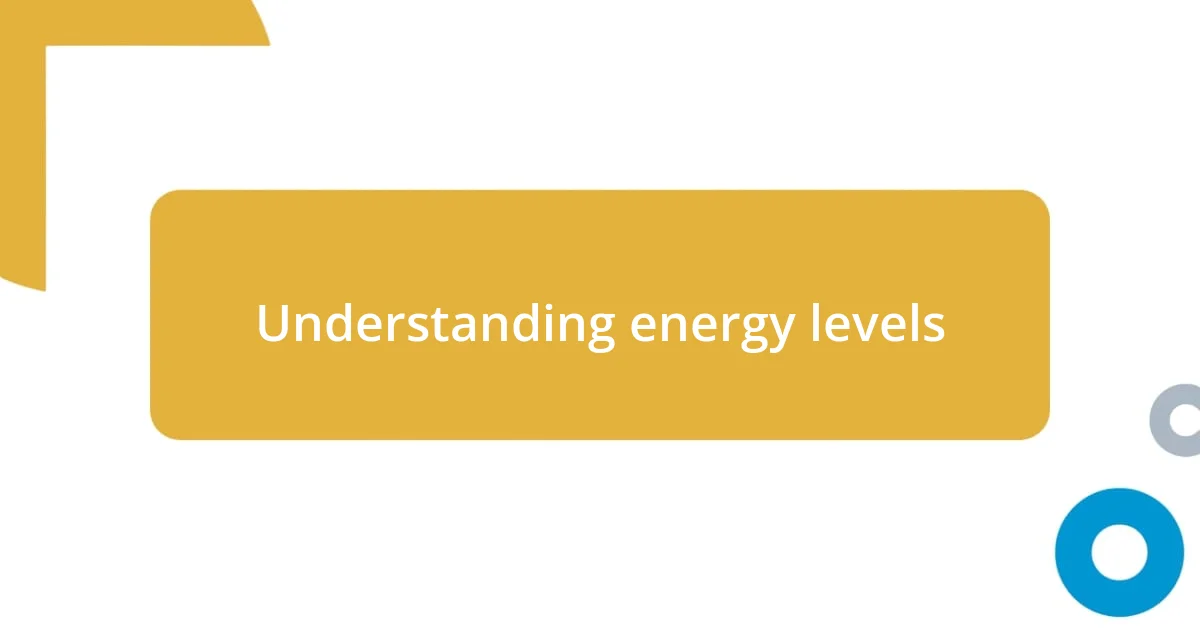
Understanding energy levels
Understanding energy levels can be quite a personal journey. I remember attending a full-day conference once, feeling that familiar fatigue creeping in by midday. It struck me how different people seemed to manage their energy: some were vibrant, while others were drained. What is it that makes this difference, and how can we tap into that energy reservoir?
Energy levels fluctuate, influenced by various factors such as nutrition, sleep, and even our emotional states. I’ve noticed that when I’m feeling anxious, my energy plummets. It’s fascinating how our minds and bodies are intertwined; even a positive mindset can boost energy just as much as a healthy snack. Have you ever felt a surge of energy during a great conversation? It’s those moments that remind me how crucial the mental aspect is in shaping our physical vitality.
In my experience, understanding my own energy patterns has helped me better prepare for long events. I’ve learned to take mental breaks—stepping outside for fresh air or doing a quick stretch can reset my focus. What works for you? Sometimes, it’s just about finding those small pockets of time to recharge before diving back in.
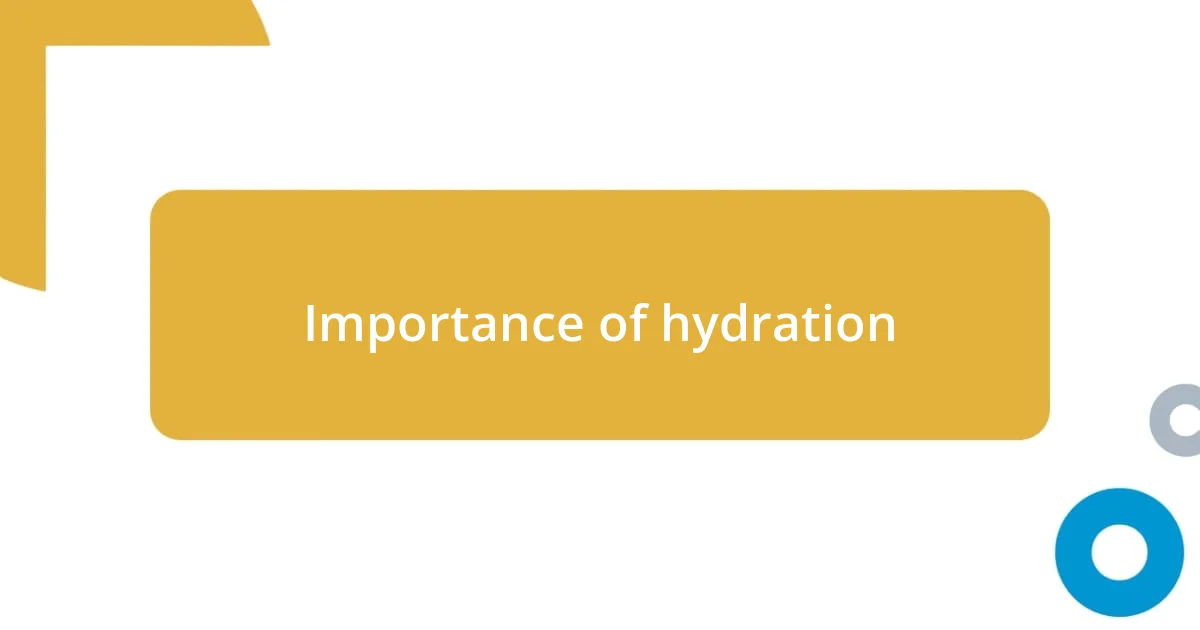
Importance of hydration
Hydration plays a pivotal role in sustaining energy during lengthy events. I’ve had days where I forgot to drink enough water, and the tiredness hit me like a ton of bricks. It’s surprising how something so simple can often slip our minds, yet staying hydrated keeps both our body and brain functioning optimally.
Here are some key points to consider about hydration:
- Water regulates body temperature, helping to maintain energy levels.
- Even mild dehydration can lead to fatigue and decreased focus.
- Drinking water aids digestion, ensuring nutrients are absorbed effectively.
- Keeping a water bottle handy makes it easier to remember to sip throughout the day.
- Hydrating foods like fruits and vegetables also contribute to overall fluid intake.
I always make it a point to carry a water bottle with me during long meetings and events. It becomes a part of my routine. Whenever I take a sip, I feel a renewed sense of alertness and clarity, reminding me just how vital hydration is for maintaining consistent energy.
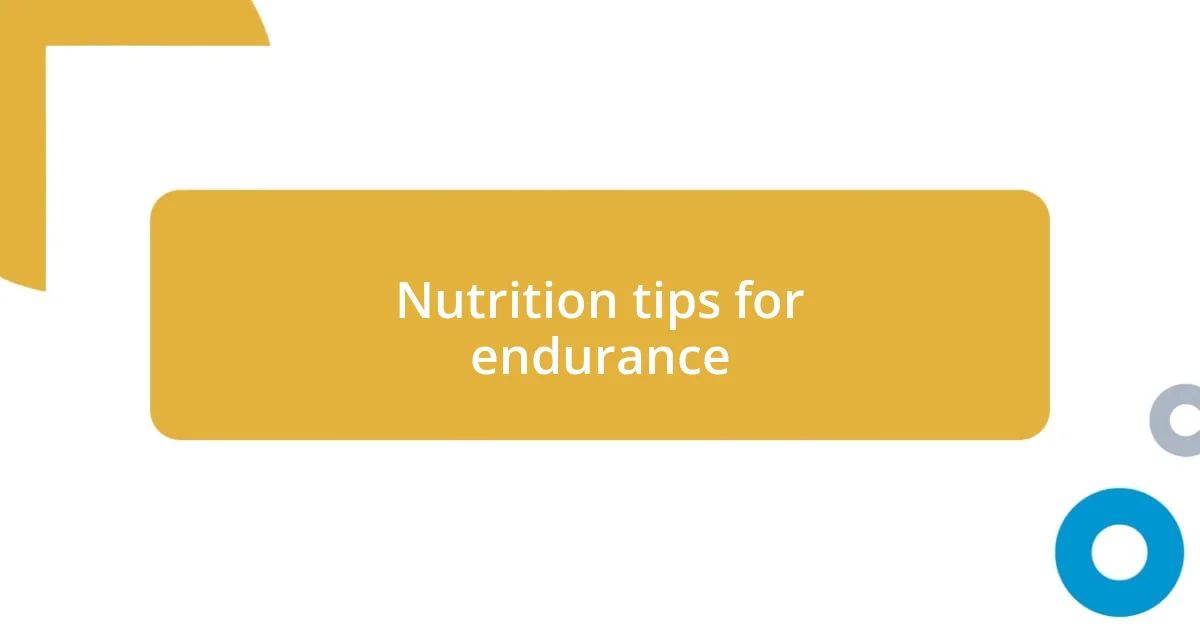
Nutrition tips for endurance
Nutrition is a cornerstone of endurance during long events; what we eat has a profound impact on our energy levels. When I’m gearing up for a marathon work session or an all-day conference, I choose balanced meals rich in complex carbohydrates, proteins, and healthy fats. I remember the time I mistakenly opted for a sugary pastry instead of my usual oatmeal in the morning. By mid-morning, my energy dipped dramatically, leaving me dragging my feet. What a difference a wholesome breakfast can make!
In addition to choosing solid meals, timing matters too. I’ve learned to snack wisely during events. Nuts and dried fruits are my go-to options; they’re packed with energy and easy to tuck into my bag. One day, during a particularly long seminar, I reached for a handful of almonds and felt instantly revitalized. I noticed how my concentration sharpened, proving that fueling our bodies properly is an art and a science. Isn’t it fascinating how food can serve as both sustenance and motivation?
Lastly, don’t forget about electrolytes! They’re not just for athletes. I always keep an electrolyte drink on hand, especially during lengthy engagements. Once, at an outdoor event, I felt the afternoon slump hit hard when I forgot to replenish my electrolytes. After sipping a sports drink, I felt my energy levels surge. It’s incredible how nutrition can transform our experience during long events, keeping us engaged and focused.
| Nutrition Aspect | Importance |
|---|---|
| Complex Carbohydrates | Provide sustained energy release |
| Proteins | Support muscle function and recovery |
| Healthy Fats | Contribute to satiety and energy |
| Electrolytes | Maintain hydration and prevent fatigue |
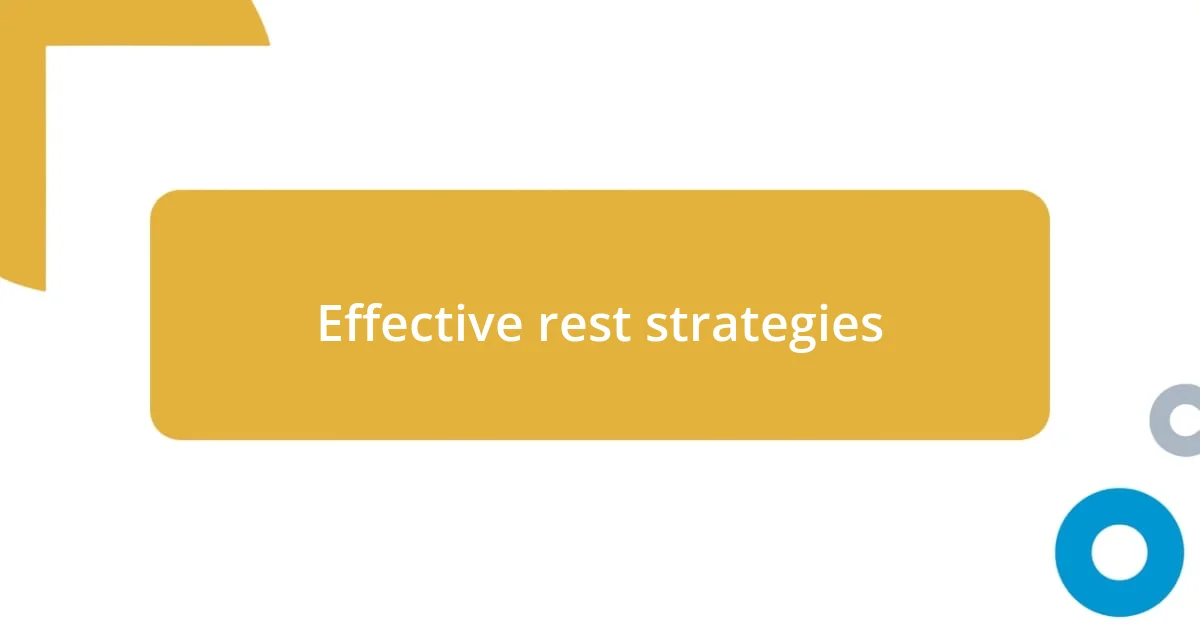
Effective rest strategies
Finding effective rest strategies is essential when navigating long events. One simple technique I’ve embraced is the power of short breaks. I can’t stress enough how stepping away from the hustle—even just for five minutes—can work wonders for my focus. During a marathon brainstorming session, I once took a moment to walk outside and breathe in fresh air. That brief pause not only cleared my mind but also infused me with renewed energy to tackle the next challenge. Do you realize how a tiny reset can change your perspective?
In addition to short breaks, I actively incorporate mindful breathing exercises into my routine. I’ve found that closing my eyes and taking a few deep, slow breaths allows me to recharge almost instantly. During a lengthy conference, I felt my energy fading and decided to try this technique. Surprisingly, it felt like a mini-vacation from the crowd. With each breath, I envisioned myself building up my mental stamina, transforming my weariness into alertness. It’s a simple yet effective strategy that anyone can try—why not give it a go at your next long event?
Lastly, I’ve discovered the importance of finding a cozy spot for those longer breaks. Whether it’s a quiet nook away from the hustle or a comfy chair, having a designated rest area makes a significant difference. I vividly remember an event where I found a little corner by a window. When I nestled into that space, the outside light brought clarity to my thoughts while soothing my senses. That moment of respite grounded me, allowing me to face the next session with fresh enthusiasm. How do you create your own energy-boosting sanctuary during long periods of engagement? It’s all about finding what works for you!
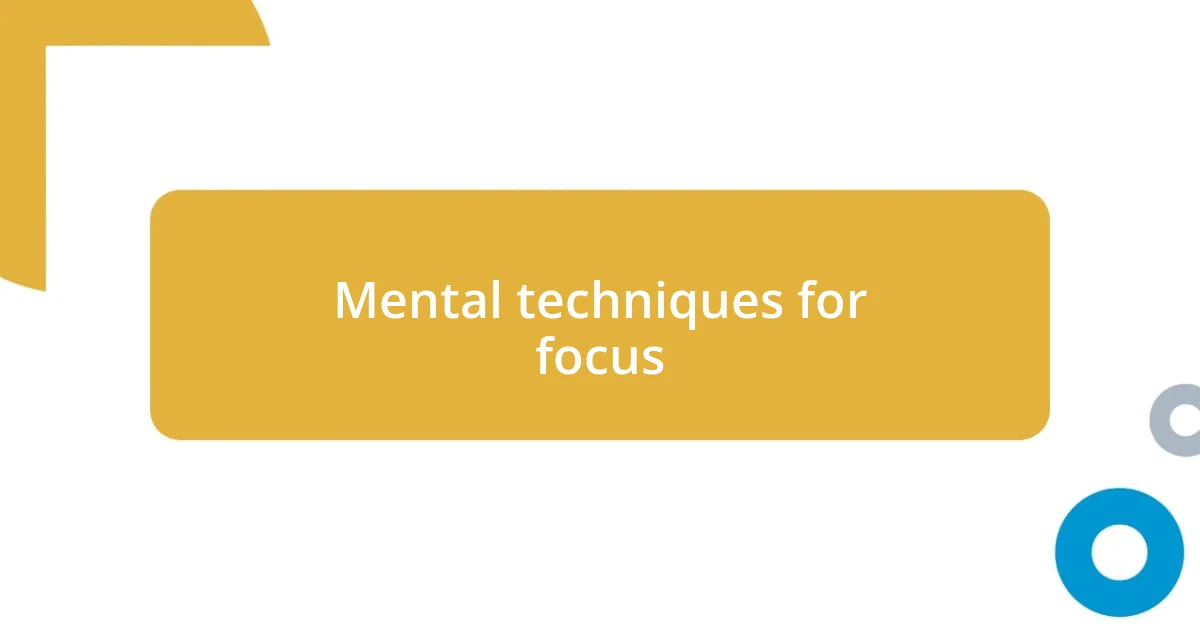
Mental techniques for focus
When it comes to mental techniques for focus, visualization has always been a game-changer for me. I vividly picture the tasks ahead, mentally mapping out what I need to accomplish. This approach has helped me feel more prepared and less overwhelmed. Just the other day, I had an intensive workshop scheduled, and I took a moment to imagine walking through each session confidently. Surprisingly, this simple technique made me feel more in control, highlighting how our thoughts can shape our performance. Have you ever visualized success before a big event?
Another technique I find incredibly effective is breaking tasks into smaller, manageable chunks. It transforms daunting projects into bite-sized pieces that feel less intimidating. I recall a time when I prepared for a lengthy presentation. Instead of trying to tackle everything at once, I divided the content into sections, setting mini-goals with a sense of accomplishment. By the end, I had a solid presentation ready, and I felt more energized than if I’d spent hours trying to do it all at once. Doesn’t it feel rewarding to celebrate those small victories along the way?
Additionally, I’ve embraced positive affirmations to boost my focus. When my mind starts to wander, I remind myself of my capabilities with phrases like, “I am confident and focused.” One afternoon, during an all-day seminar, I found myself struggling to stay engaged. So, I looked in the mirror and repeated my affirmations, instantly re-energizing my mindset. It’s fascinating how our internal dialogue can significantly affect our productivity, don’t you think? Finding the right phrase that resonates with you can make a world of difference in your mental clarity and focus.
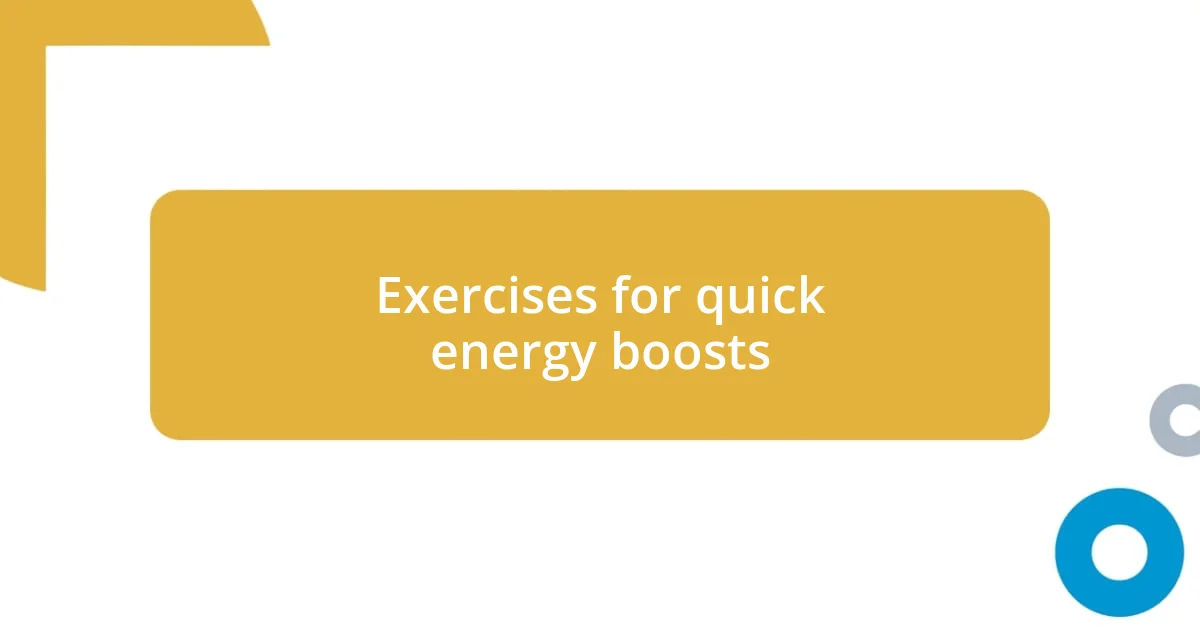
Exercises for quick energy boosts
I’ve found that even a few minutes of movement can work wonders when I’m feeling sluggish. A quick set of jumping jacks or a short bout of high-knees gets my heart pumping, elevating my energy levels instantly. I remember once at a lengthy meeting, I convinced a few colleagues to join me for a brief mini dance party in the break room. It not only lifted our spirits but also brought an unexpected burst of energy that carried us through the rest of the day. Have you ever considered how something as simple as five minutes of physical activity can transform your mood?
Stretching is another go-to for a quick refresh. I often do simple neck and shoulder rolls when tension creeps in during long events. Just the other day, while attending a webinar, I took a moment to stretch my arms over my head and lean side to side. It felt like recharging my batteries, shaking off the lethargy from sitting too long. Trust me, a little stretch can make you feel like you’re breathing new life into your body.
Sometimes, I find that a brisk walk works miracles for my energy levels. I vividly recall a monotonous afternoon spent indoors at a conference when I decided to step outside for a quick lap around the building. The fresh air, combined with a change of scenery, re-energized me and sparked new ideas I hadn’t thought of before. Have you tried incorporating short walks into your routine during long events? That little shift in my environment opened up fresh pathways in my mind, and I returned to my seat ready to engage.
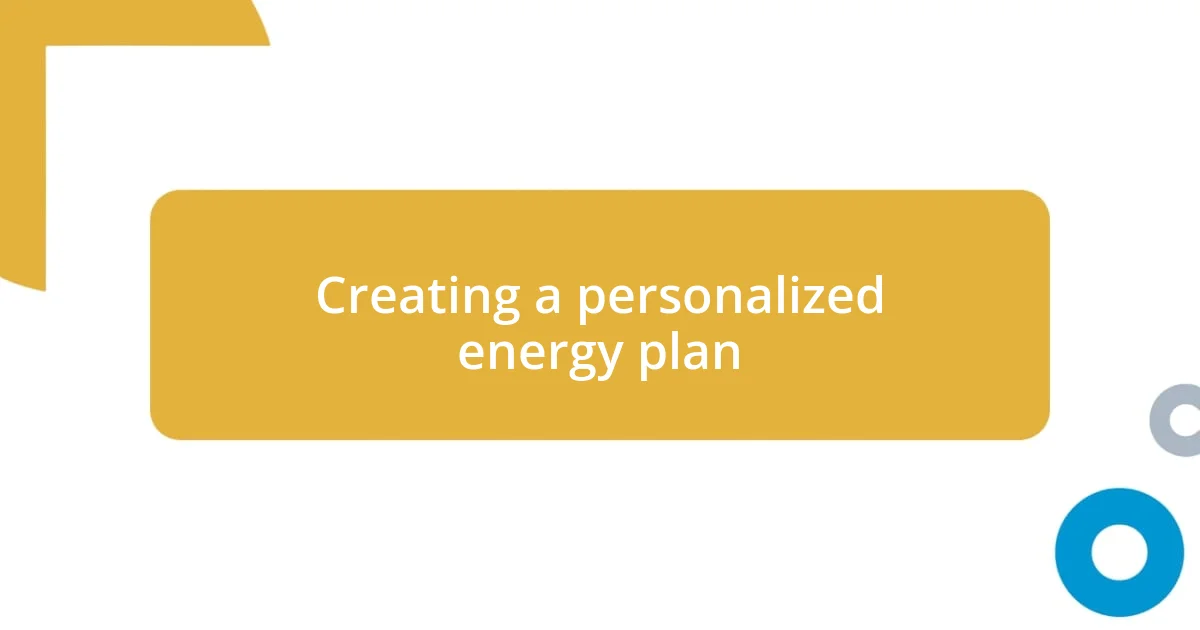
Creating a personalized energy plan
Creating a personalized energy plan starts with understanding your unique rhythms. For me, that means recognizing when I feel the most productive and alert throughout the day. I remember a time when I stumbled upon the idea of scheduling my most challenging tasks during my peak hours. It not only helped me stay focused but also made the entire day feel more manageable. What are your most energetic moments?
Dialing in on nutrition is another essential element of my energy plan. I’ve experimented with different snacks to see how they influence my stamina during long events. One day, I opted for a handful of almonds instead of my usual granola bar, and to my surprise, the steady release of energy kept me feeling sharp and engaged. Have you ever noticed how certain foods can impact your focus levels?
Lastly, integrating short breaks into my energy plan has been transformative. Taking a moment to close my eyes and breathe deeply can reset my brain, especially during marathon sessions. I distinctly remember attending a full-day workshop, where a five-minute pause significantly improved my concentration. These little interludes between activities act like mini-recharges, don’t you agree? Why not experiment with incorporating brief breaks into your own routine? You’ll likely find that it enhances your overall performance and mood.












